Contract Law: Critical Analysis of Kakavas v Crown Melbourne [2013]
VerifiedAdded on 2022/09/15
|10
|2792
|18
Case Study
AI Summary
This case study provides a critical analysis of Kakavas v Crown Melbourne Ltd [2013] HCA 25, focusing on the issue of unconscionable conduct in contract law. The analysis examines the facts of the case, where a problem gambler, Kakavas, sued Crown Casino for unconscionable conduct, alleging they exploited his gambling addiction. The study delves into the relevant legal rules, including the doctrine of unconscionability, the Australian Consumer Law (ACL), and the concept of special disadvantage. It discusses the court's decision, which rejected Kakavas's claims, emphasizing that Crown had no general duty to protect gamblers from themselves. The analysis critically evaluates the court's reasoning, particularly its interpretation of 'special disadvantage' and its potential impact on the application of unconscionable conduct principles. The study argues that the court's decision may have disregarded the nature of pathological addictions and misconstrued the psychological evidence. The analysis also highlights the implications of the decision for future cases involving similar issues and the need for a more nuanced understanding of unconscionable conduct in the context of addiction and exploitation.
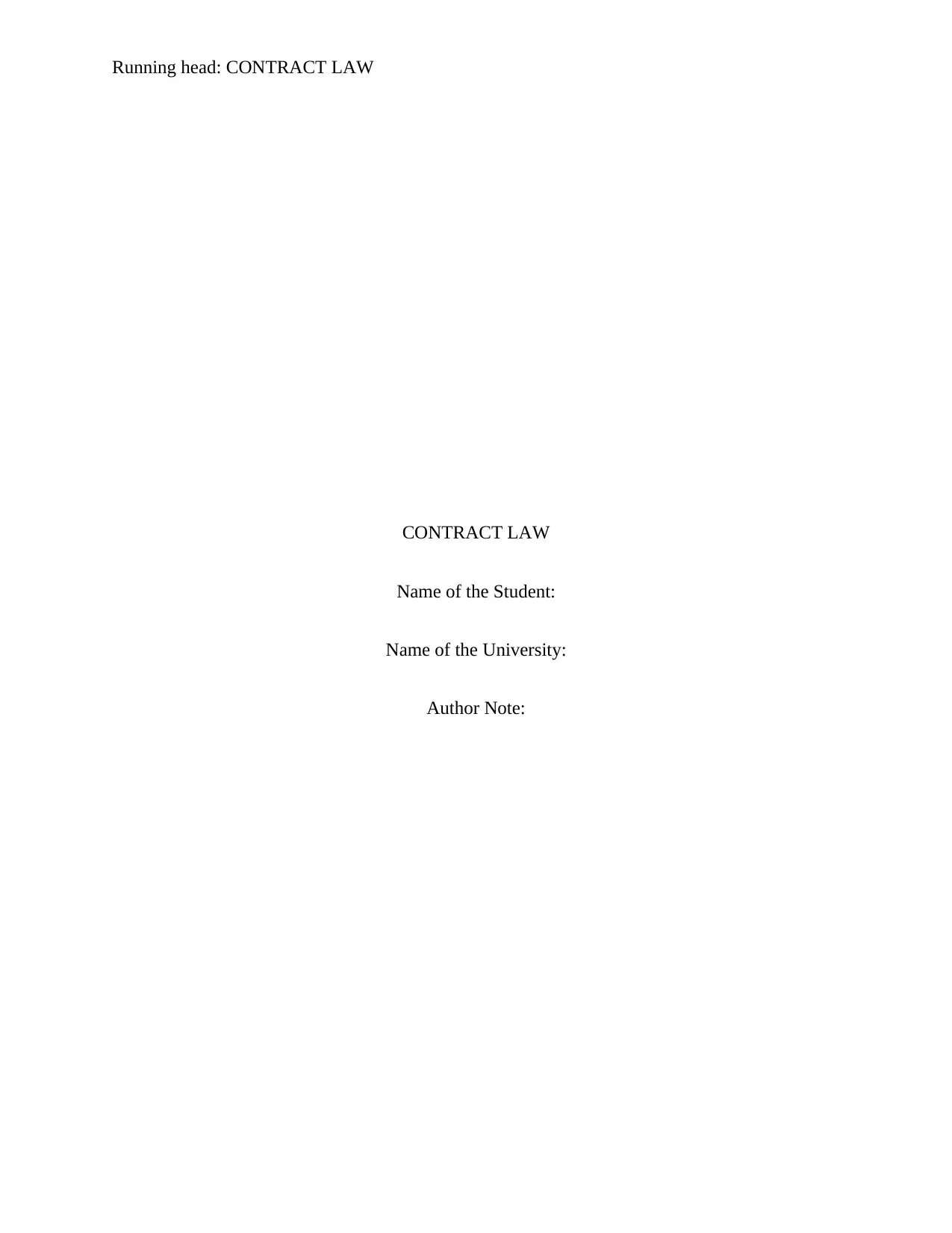
Running head: CONTRACT LAW
CONTRACT LAW
Name of the Student:
Name of the University:
Author Note:
CONTRACT LAW
Name of the Student:
Name of the University:
Author Note:
Paraphrase This Document
Need a fresh take? Get an instant paraphrase of this document with our AI Paraphraser
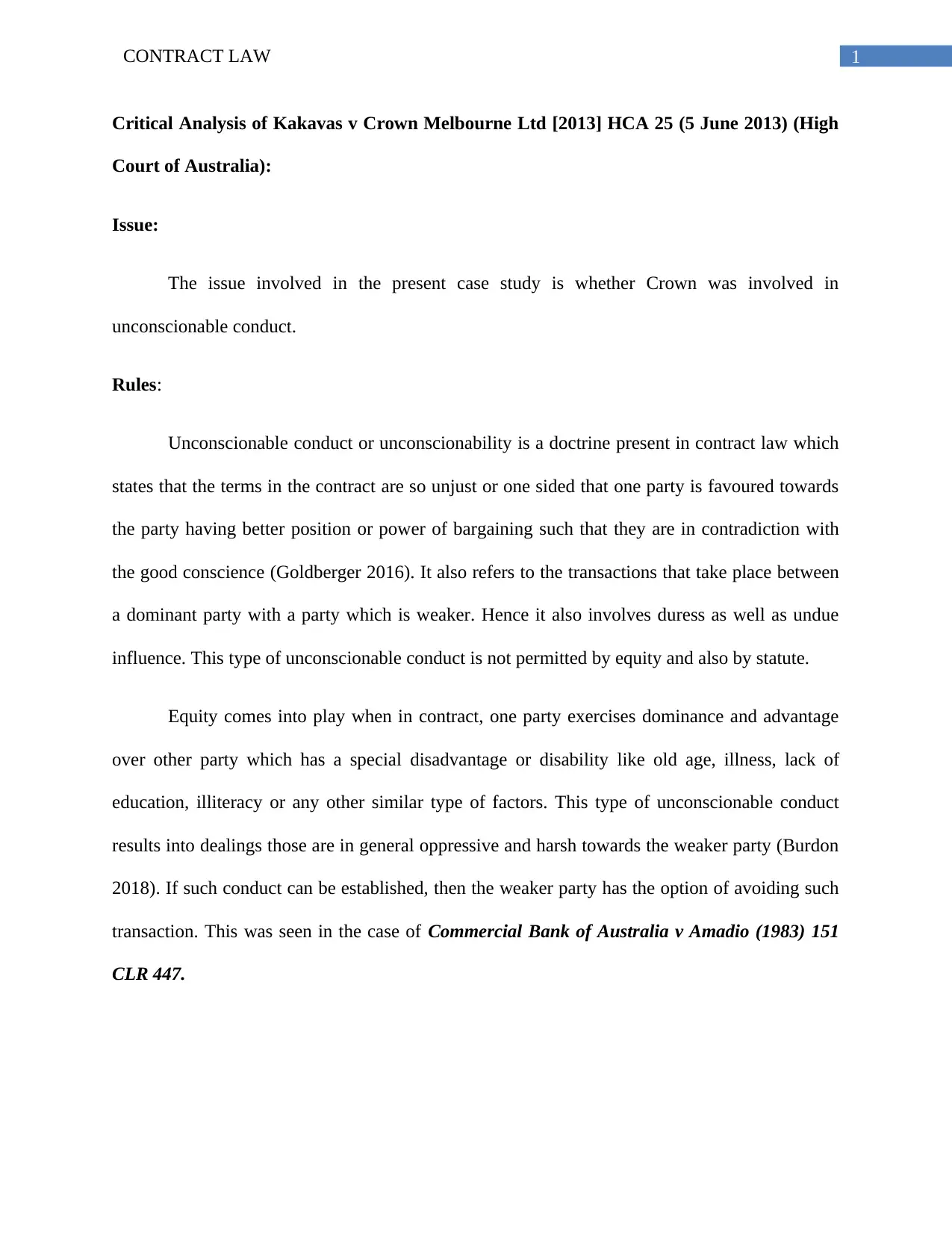
1CONTRACT LAW
Critical Analysis of Kakavas v Crown Melbourne Ltd [2013] HCA 25 (5 June 2013) (High
Court of Australia):
Issue:
The issue involved in the present case study is whether Crown was involved in
unconscionable conduct.
Rules:
Unconscionable conduct or unconscionability is a doctrine present in contract law which
states that the terms in the contract are so unjust or one sided that one party is favoured towards
the party having better position or power of bargaining such that they are in contradiction with
the good conscience (Goldberger 2016). It also refers to the transactions that take place between
a dominant party with a party which is weaker. Hence it also involves duress as well as undue
influence. This type of unconscionable conduct is not permitted by equity and also by statute.
Equity comes into play when in contract, one party exercises dominance and advantage
over other party which has a special disadvantage or disability like old age, illness, lack of
education, illiteracy or any other similar type of factors. This type of unconscionable conduct
results into dealings those are in general oppressive and harsh towards the weaker party (Burdon
2018). If such conduct can be established, then the weaker party has the option of avoiding such
transaction. This was seen in the case of Commercial Bank of Australia v Amadio (1983) 151
CLR 447.
Critical Analysis of Kakavas v Crown Melbourne Ltd [2013] HCA 25 (5 June 2013) (High
Court of Australia):
Issue:
The issue involved in the present case study is whether Crown was involved in
unconscionable conduct.
Rules:
Unconscionable conduct or unconscionability is a doctrine present in contract law which
states that the terms in the contract are so unjust or one sided that one party is favoured towards
the party having better position or power of bargaining such that they are in contradiction with
the good conscience (Goldberger 2016). It also refers to the transactions that take place between
a dominant party with a party which is weaker. Hence it also involves duress as well as undue
influence. This type of unconscionable conduct is not permitted by equity and also by statute.
Equity comes into play when in contract, one party exercises dominance and advantage
over other party which has a special disadvantage or disability like old age, illness, lack of
education, illiteracy or any other similar type of factors. This type of unconscionable conduct
results into dealings those are in general oppressive and harsh towards the weaker party (Burdon
2018). If such conduct can be established, then the weaker party has the option of avoiding such
transaction. This was seen in the case of Commercial Bank of Australia v Amadio (1983) 151
CLR 447.
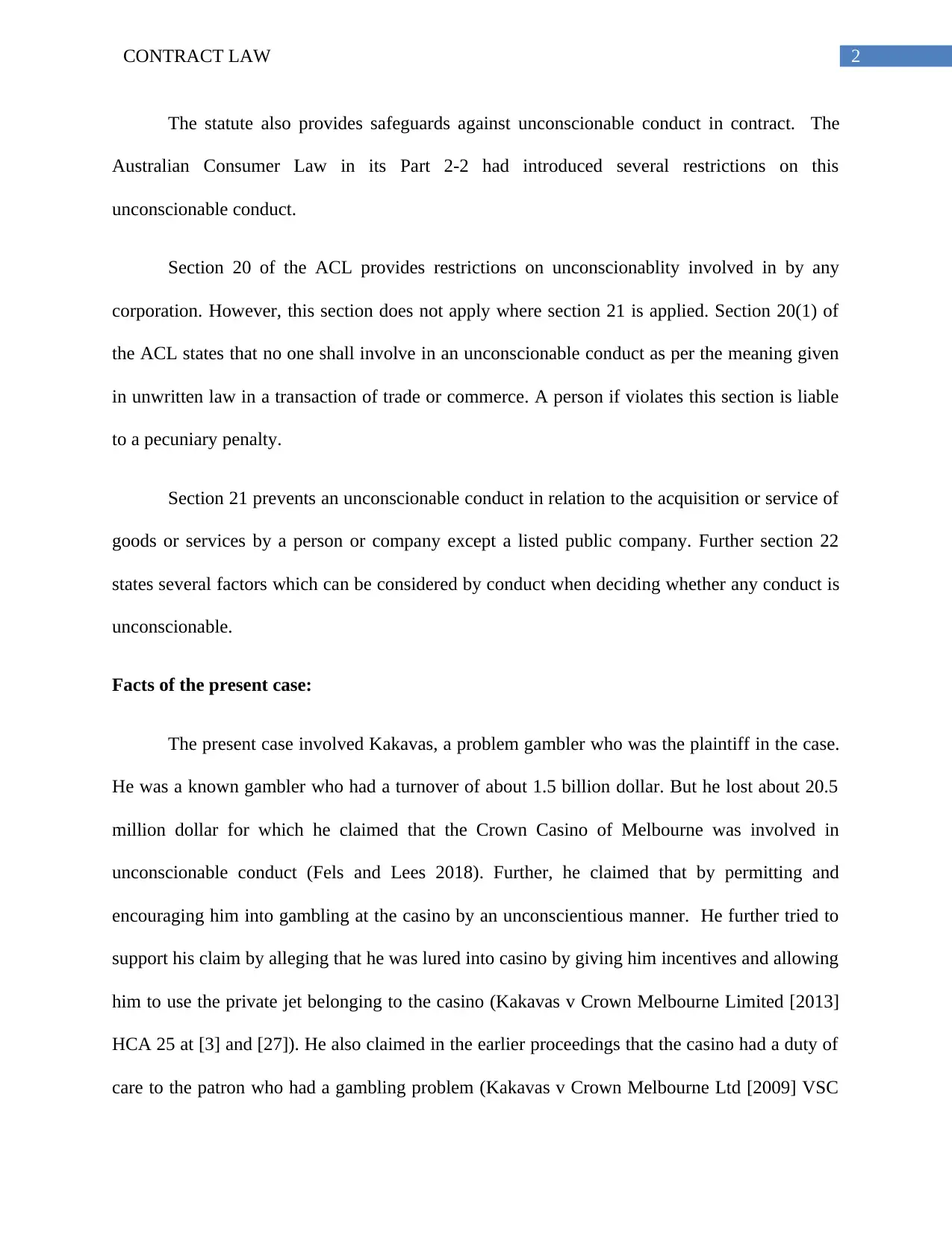
2CONTRACT LAW
The statute also provides safeguards against unconscionable conduct in contract. The
Australian Consumer Law in its Part 2-2 had introduced several restrictions on this
unconscionable conduct.
Section 20 of the ACL provides restrictions on unconscionablity involved in by any
corporation. However, this section does not apply where section 21 is applied. Section 20(1) of
the ACL states that no one shall involve in an unconscionable conduct as per the meaning given
in unwritten law in a transaction of trade or commerce. A person if violates this section is liable
to a pecuniary penalty.
Section 21 prevents an unconscionable conduct in relation to the acquisition or service of
goods or services by a person or company except a listed public company. Further section 22
states several factors which can be considered by conduct when deciding whether any conduct is
unconscionable.
Facts of the present case:
The present case involved Kakavas, a problem gambler who was the plaintiff in the case.
He was a known gambler who had a turnover of about 1.5 billion dollar. But he lost about 20.5
million dollar for which he claimed that the Crown Casino of Melbourne was involved in
unconscionable conduct (Fels and Lees 2018). Further, he claimed that by permitting and
encouraging him into gambling at the casino by an unconscientious manner. He further tried to
support his claim by alleging that he was lured into casino by giving him incentives and allowing
him to use the private jet belonging to the casino (Kakavas v Crown Melbourne Limited [2013]
HCA 25 at [3] and [27]). He also claimed in the earlier proceedings that the casino had a duty of
care to the patron who had a gambling problem (Kakavas v Crown Melbourne Ltd [2009] VSC
The statute also provides safeguards against unconscionable conduct in contract. The
Australian Consumer Law in its Part 2-2 had introduced several restrictions on this
unconscionable conduct.
Section 20 of the ACL provides restrictions on unconscionablity involved in by any
corporation. However, this section does not apply where section 21 is applied. Section 20(1) of
the ACL states that no one shall involve in an unconscionable conduct as per the meaning given
in unwritten law in a transaction of trade or commerce. A person if violates this section is liable
to a pecuniary penalty.
Section 21 prevents an unconscionable conduct in relation to the acquisition or service of
goods or services by a person or company except a listed public company. Further section 22
states several factors which can be considered by conduct when deciding whether any conduct is
unconscionable.
Facts of the present case:
The present case involved Kakavas, a problem gambler who was the plaintiff in the case.
He was a known gambler who had a turnover of about 1.5 billion dollar. But he lost about 20.5
million dollar for which he claimed that the Crown Casino of Melbourne was involved in
unconscionable conduct (Fels and Lees 2018). Further, he claimed that by permitting and
encouraging him into gambling at the casino by an unconscientious manner. He further tried to
support his claim by alleging that he was lured into casino by giving him incentives and allowing
him to use the private jet belonging to the casino (Kakavas v Crown Melbourne Limited [2013]
HCA 25 at [3] and [27]). He also claimed in the earlier proceedings that the casino had a duty of
care to the patron who had a gambling problem (Kakavas v Crown Melbourne Ltd [2009] VSC
⊘ This is a preview!⊘
Do you want full access?
Subscribe today to unlock all pages.

Trusted by 1+ million students worldwide
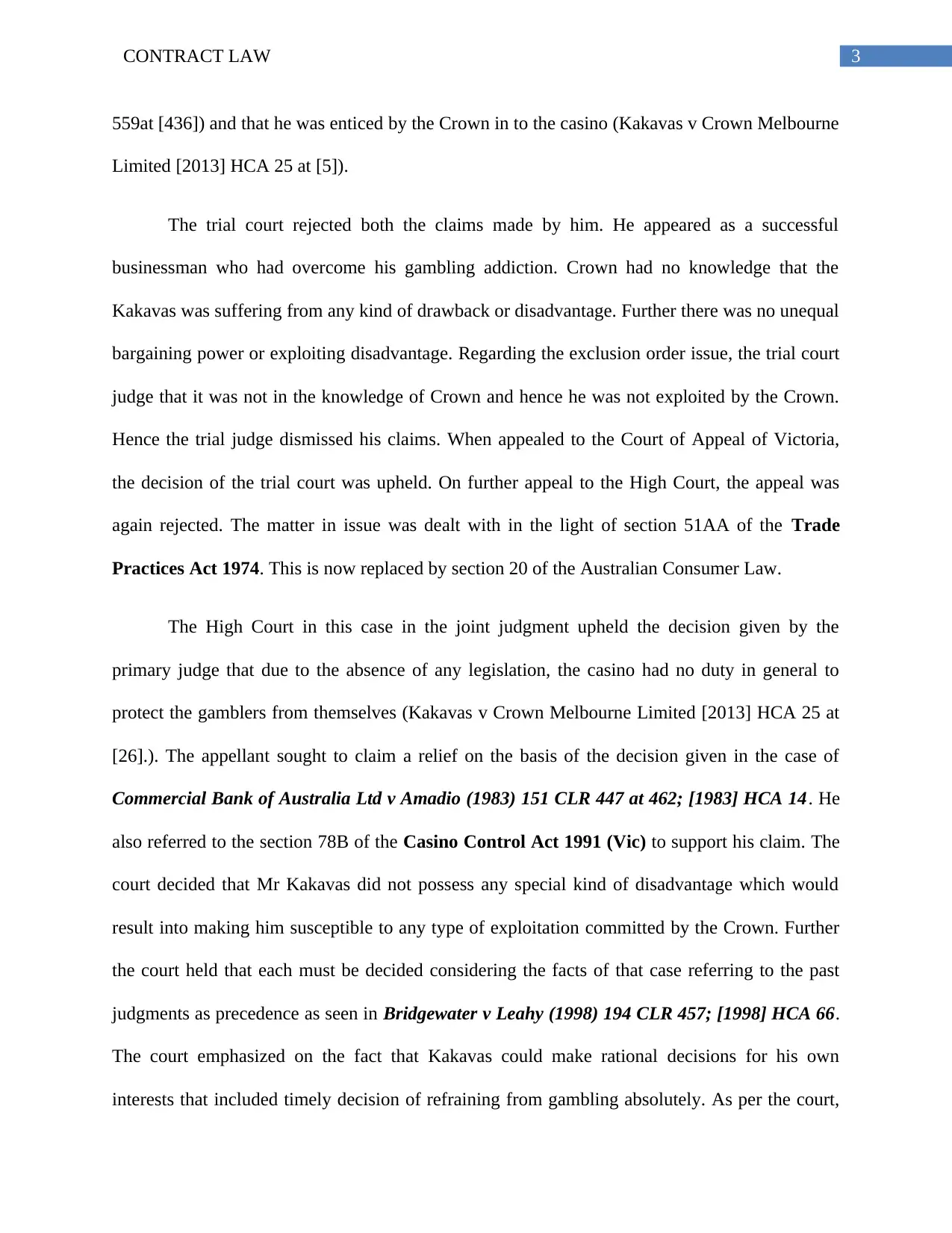
3CONTRACT LAW
559at [436]) and that he was enticed by the Crown in to the casino (Kakavas v Crown Melbourne
Limited [2013] HCA 25 at [5]).
The trial court rejected both the claims made by him. He appeared as a successful
businessman who had overcome his gambling addiction. Crown had no knowledge that the
Kakavas was suffering from any kind of drawback or disadvantage. Further there was no unequal
bargaining power or exploiting disadvantage. Regarding the exclusion order issue, the trial court
judge that it was not in the knowledge of Crown and hence he was not exploited by the Crown.
Hence the trial judge dismissed his claims. When appealed to the Court of Appeal of Victoria,
the decision of the trial court was upheld. On further appeal to the High Court, the appeal was
again rejected. The matter in issue was dealt with in the light of section 51AA of the Trade
Practices Act 1974. This is now replaced by section 20 of the Australian Consumer Law.
The High Court in this case in the joint judgment upheld the decision given by the
primary judge that due to the absence of any legislation, the casino had no duty in general to
protect the gamblers from themselves (Kakavas v Crown Melbourne Limited [2013] HCA 25 at
[26].). The appellant sought to claim a relief on the basis of the decision given in the case of
Commercial Bank of Australia Ltd v Amadio (1983) 151 CLR 447 at 462; [1983] HCA 14. He
also referred to the section 78B of the Casino Control Act 1991 (Vic) to support his claim. The
court decided that Mr Kakavas did not possess any special kind of disadvantage which would
result into making him susceptible to any type of exploitation committed by the Crown. Further
the court held that each must be decided considering the facts of that case referring to the past
judgments as precedence as seen in Bridgewater v Leahy (1998) 194 CLR 457; [1998] HCA 66.
The court emphasized on the fact that Kakavas could make rational decisions for his own
interests that included timely decision of refraining from gambling absolutely. As per the court,
559at [436]) and that he was enticed by the Crown in to the casino (Kakavas v Crown Melbourne
Limited [2013] HCA 25 at [5]).
The trial court rejected both the claims made by him. He appeared as a successful
businessman who had overcome his gambling addiction. Crown had no knowledge that the
Kakavas was suffering from any kind of drawback or disadvantage. Further there was no unequal
bargaining power or exploiting disadvantage. Regarding the exclusion order issue, the trial court
judge that it was not in the knowledge of Crown and hence he was not exploited by the Crown.
Hence the trial judge dismissed his claims. When appealed to the Court of Appeal of Victoria,
the decision of the trial court was upheld. On further appeal to the High Court, the appeal was
again rejected. The matter in issue was dealt with in the light of section 51AA of the Trade
Practices Act 1974. This is now replaced by section 20 of the Australian Consumer Law.
The High Court in this case in the joint judgment upheld the decision given by the
primary judge that due to the absence of any legislation, the casino had no duty in general to
protect the gamblers from themselves (Kakavas v Crown Melbourne Limited [2013] HCA 25 at
[26].). The appellant sought to claim a relief on the basis of the decision given in the case of
Commercial Bank of Australia Ltd v Amadio (1983) 151 CLR 447 at 462; [1983] HCA 14. He
also referred to the section 78B of the Casino Control Act 1991 (Vic) to support his claim. The
court decided that Mr Kakavas did not possess any special kind of disadvantage which would
result into making him susceptible to any type of exploitation committed by the Crown. Further
the court held that each must be decided considering the facts of that case referring to the past
judgments as precedence as seen in Bridgewater v Leahy (1998) 194 CLR 457; [1998] HCA 66.
The court emphasized on the fact that Kakavas could make rational decisions for his own
interests that included timely decision of refraining from gambling absolutely. As per the court,
Paraphrase This Document
Need a fresh take? Get an instant paraphrase of this document with our AI Paraphraser
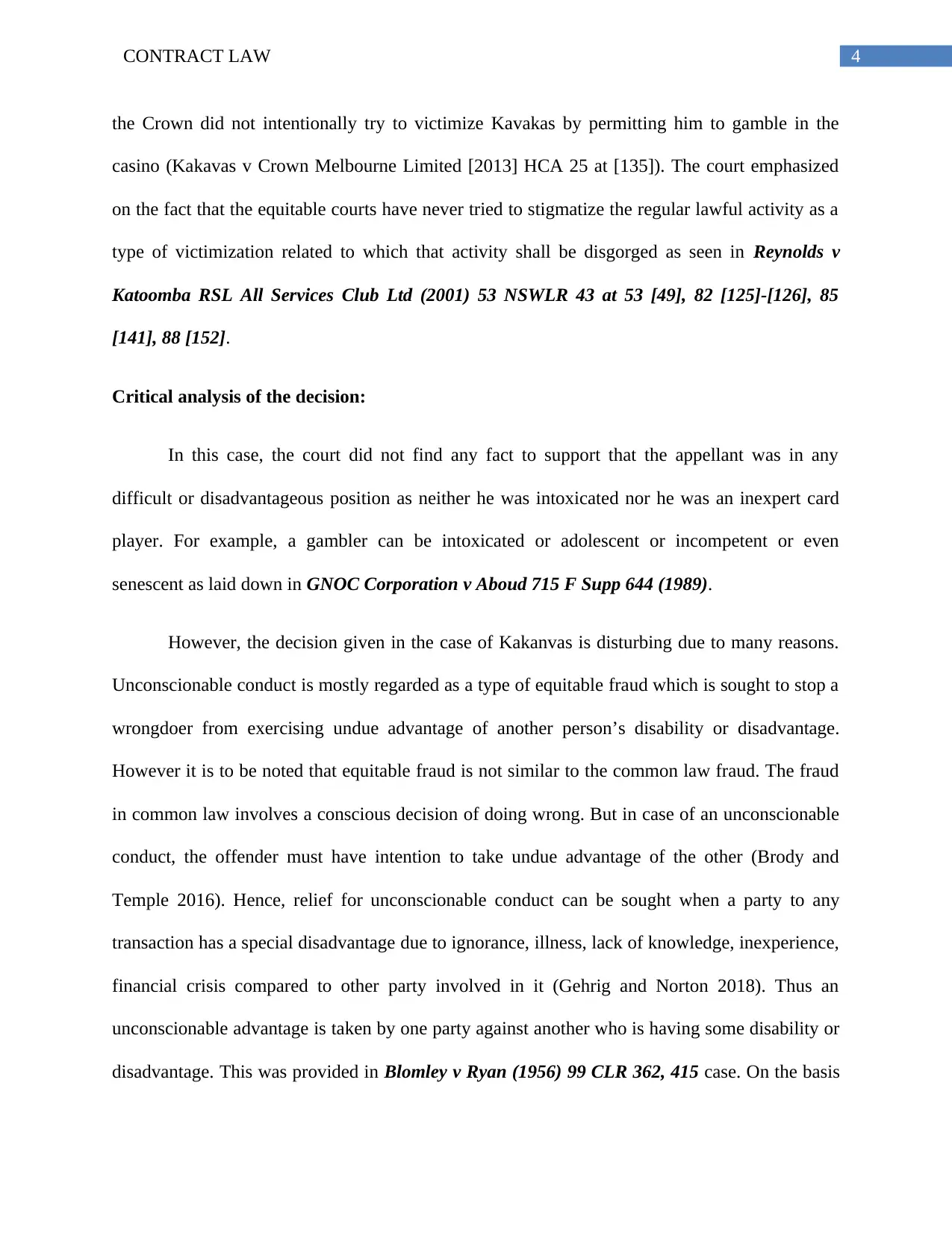
4CONTRACT LAW
the Crown did not intentionally try to victimize Kavakas by permitting him to gamble in the
casino (Kakavas v Crown Melbourne Limited [2013] HCA 25 at [135]). The court emphasized
on the fact that the equitable courts have never tried to stigmatize the regular lawful activity as a
type of victimization related to which that activity shall be disgorged as seen in Reynolds v
Katoomba RSL All Services Club Ltd (2001) 53 NSWLR 43 at 53 [49], 82 [125]-[126], 85
[141], 88 [152].
Critical analysis of the decision:
In this case, the court did not find any fact to support that the appellant was in any
difficult or disadvantageous position as neither he was intoxicated nor he was an inexpert card
player. For example, a gambler can be intoxicated or adolescent or incompetent or even
senescent as laid down in GNOC Corporation v Aboud 715 F Supp 644 (1989).
However, the decision given in the case of Kakanvas is disturbing due to many reasons.
Unconscionable conduct is mostly regarded as a type of equitable fraud which is sought to stop a
wrongdoer from exercising undue advantage of another person’s disability or disadvantage.
However it is to be noted that equitable fraud is not similar to the common law fraud. The fraud
in common law involves a conscious decision of doing wrong. But in case of an unconscionable
conduct, the offender must have intention to take undue advantage of the other (Brody and
Temple 2016). Hence, relief for unconscionable conduct can be sought when a party to any
transaction has a special disadvantage due to ignorance, illness, lack of knowledge, inexperience,
financial crisis compared to other party involved in it (Gehrig and Norton 2018). Thus an
unconscionable advantage is taken by one party against another who is having some disability or
disadvantage. This was provided in Blomley v Ryan (1956) 99 CLR 362, 415 case. On the basis
the Crown did not intentionally try to victimize Kavakas by permitting him to gamble in the
casino (Kakavas v Crown Melbourne Limited [2013] HCA 25 at [135]). The court emphasized
on the fact that the equitable courts have never tried to stigmatize the regular lawful activity as a
type of victimization related to which that activity shall be disgorged as seen in Reynolds v
Katoomba RSL All Services Club Ltd (2001) 53 NSWLR 43 at 53 [49], 82 [125]-[126], 85
[141], 88 [152].
Critical analysis of the decision:
In this case, the court did not find any fact to support that the appellant was in any
difficult or disadvantageous position as neither he was intoxicated nor he was an inexpert card
player. For example, a gambler can be intoxicated or adolescent or incompetent or even
senescent as laid down in GNOC Corporation v Aboud 715 F Supp 644 (1989).
However, the decision given in the case of Kakanvas is disturbing due to many reasons.
Unconscionable conduct is mostly regarded as a type of equitable fraud which is sought to stop a
wrongdoer from exercising undue advantage of another person’s disability or disadvantage.
However it is to be noted that equitable fraud is not similar to the common law fraud. The fraud
in common law involves a conscious decision of doing wrong. But in case of an unconscionable
conduct, the offender must have intention to take undue advantage of the other (Brody and
Temple 2016). Hence, relief for unconscionable conduct can be sought when a party to any
transaction has a special disadvantage due to ignorance, illness, lack of knowledge, inexperience,
financial crisis compared to other party involved in it (Gehrig and Norton 2018). Thus an
unconscionable advantage is taken by one party against another who is having some disability or
disadvantage. This was provided in Blomley v Ryan (1956) 99 CLR 362, 415 case. On the basis
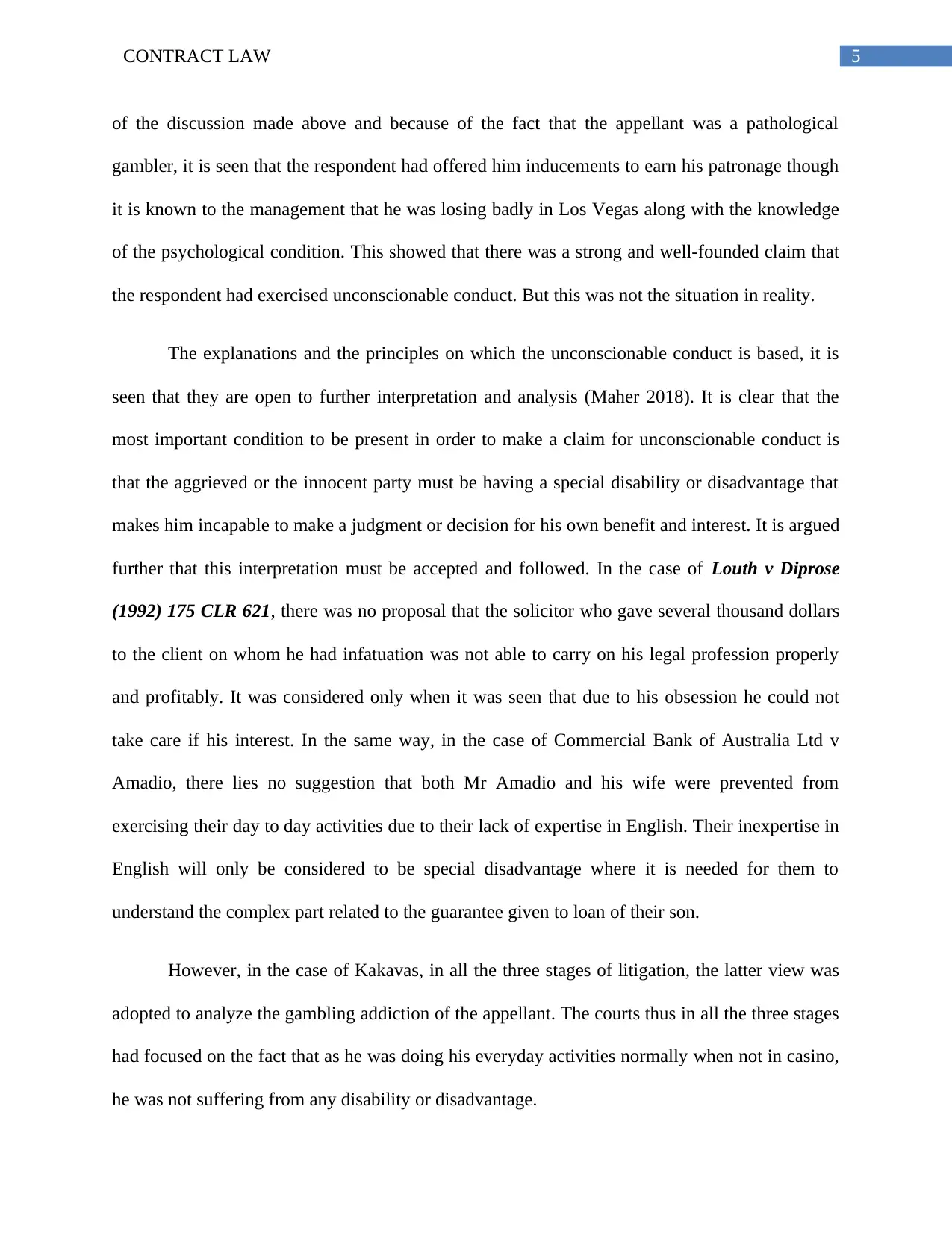
5CONTRACT LAW
of the discussion made above and because of the fact that the appellant was a pathological
gambler, it is seen that the respondent had offered him inducements to earn his patronage though
it is known to the management that he was losing badly in Los Vegas along with the knowledge
of the psychological condition. This showed that there was a strong and well-founded claim that
the respondent had exercised unconscionable conduct. But this was not the situation in reality.
The explanations and the principles on which the unconscionable conduct is based, it is
seen that they are open to further interpretation and analysis (Maher 2018). It is clear that the
most important condition to be present in order to make a claim for unconscionable conduct is
that the aggrieved or the innocent party must be having a special disability or disadvantage that
makes him incapable to make a judgment or decision for his own benefit and interest. It is argued
further that this interpretation must be accepted and followed. In the case of Louth v Diprose
(1992) 175 CLR 621, there was no proposal that the solicitor who gave several thousand dollars
to the client on whom he had infatuation was not able to carry on his legal profession properly
and profitably. It was considered only when it was seen that due to his obsession he could not
take care if his interest. In the same way, in the case of Commercial Bank of Australia Ltd v
Amadio, there lies no suggestion that both Mr Amadio and his wife were prevented from
exercising their day to day activities due to their lack of expertise in English. Their inexpertise in
English will only be considered to be special disadvantage where it is needed for them to
understand the complex part related to the guarantee given to loan of their son.
However, in the case of Kakavas, in all the three stages of litigation, the latter view was
adopted to analyze the gambling addiction of the appellant. The courts thus in all the three stages
had focused on the fact that as he was doing his everyday activities normally when not in casino,
he was not suffering from any disability or disadvantage.
of the discussion made above and because of the fact that the appellant was a pathological
gambler, it is seen that the respondent had offered him inducements to earn his patronage though
it is known to the management that he was losing badly in Los Vegas along with the knowledge
of the psychological condition. This showed that there was a strong and well-founded claim that
the respondent had exercised unconscionable conduct. But this was not the situation in reality.
The explanations and the principles on which the unconscionable conduct is based, it is
seen that they are open to further interpretation and analysis (Maher 2018). It is clear that the
most important condition to be present in order to make a claim for unconscionable conduct is
that the aggrieved or the innocent party must be having a special disability or disadvantage that
makes him incapable to make a judgment or decision for his own benefit and interest. It is argued
further that this interpretation must be accepted and followed. In the case of Louth v Diprose
(1992) 175 CLR 621, there was no proposal that the solicitor who gave several thousand dollars
to the client on whom he had infatuation was not able to carry on his legal profession properly
and profitably. It was considered only when it was seen that due to his obsession he could not
take care if his interest. In the same way, in the case of Commercial Bank of Australia Ltd v
Amadio, there lies no suggestion that both Mr Amadio and his wife were prevented from
exercising their day to day activities due to their lack of expertise in English. Their inexpertise in
English will only be considered to be special disadvantage where it is needed for them to
understand the complex part related to the guarantee given to loan of their son.
However, in the case of Kakavas, in all the three stages of litigation, the latter view was
adopted to analyze the gambling addiction of the appellant. The courts thus in all the three stages
had focused on the fact that as he was doing his everyday activities normally when not in casino,
he was not suffering from any disability or disadvantage.
⊘ This is a preview!⊘
Do you want full access?
Subscribe today to unlock all pages.

Trusted by 1+ million students worldwide
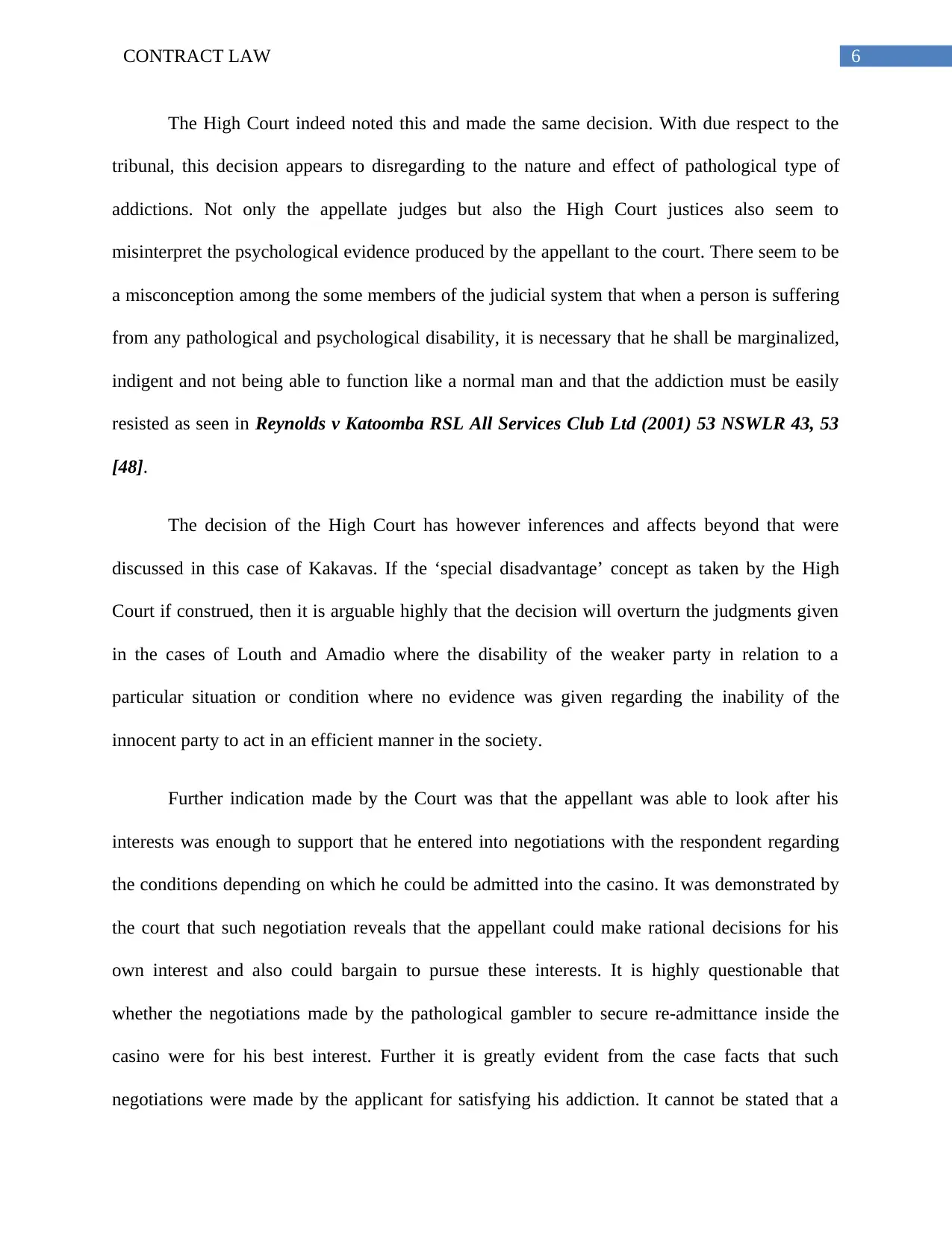
6CONTRACT LAW
The High Court indeed noted this and made the same decision. With due respect to the
tribunal, this decision appears to disregarding to the nature and effect of pathological type of
addictions. Not only the appellate judges but also the High Court justices also seem to
misinterpret the psychological evidence produced by the appellant to the court. There seem to be
a misconception among the some members of the judicial system that when a person is suffering
from any pathological and psychological disability, it is necessary that he shall be marginalized,
indigent and not being able to function like a normal man and that the addiction must be easily
resisted as seen in Reynolds v Katoomba RSL All Services Club Ltd (2001) 53 NSWLR 43, 53
[48].
The decision of the High Court has however inferences and affects beyond that were
discussed in this case of Kakavas. If the ‘special disadvantage’ concept as taken by the High
Court if construed, then it is arguable highly that the decision will overturn the judgments given
in the cases of Louth and Amadio where the disability of the weaker party in relation to a
particular situation or condition where no evidence was given regarding the inability of the
innocent party to act in an efficient manner in the society.
Further indication made by the Court was that the appellant was able to look after his
interests was enough to support that he entered into negotiations with the respondent regarding
the conditions depending on which he could be admitted into the casino. It was demonstrated by
the court that such negotiation reveals that the appellant could make rational decisions for his
own interest and also could bargain to pursue these interests. It is highly questionable that
whether the negotiations made by the pathological gambler to secure re-admittance inside the
casino were for his best interest. Further it is greatly evident from the case facts that such
negotiations were made by the applicant for satisfying his addiction. It cannot be stated that a
The High Court indeed noted this and made the same decision. With due respect to the
tribunal, this decision appears to disregarding to the nature and effect of pathological type of
addictions. Not only the appellate judges but also the High Court justices also seem to
misinterpret the psychological evidence produced by the appellant to the court. There seem to be
a misconception among the some members of the judicial system that when a person is suffering
from any pathological and psychological disability, it is necessary that he shall be marginalized,
indigent and not being able to function like a normal man and that the addiction must be easily
resisted as seen in Reynolds v Katoomba RSL All Services Club Ltd (2001) 53 NSWLR 43, 53
[48].
The decision of the High Court has however inferences and affects beyond that were
discussed in this case of Kakavas. If the ‘special disadvantage’ concept as taken by the High
Court if construed, then it is arguable highly that the decision will overturn the judgments given
in the cases of Louth and Amadio where the disability of the weaker party in relation to a
particular situation or condition where no evidence was given regarding the inability of the
innocent party to act in an efficient manner in the society.
Further indication made by the Court was that the appellant was able to look after his
interests was enough to support that he entered into negotiations with the respondent regarding
the conditions depending on which he could be admitted into the casino. It was demonstrated by
the court that such negotiation reveals that the appellant could make rational decisions for his
own interest and also could bargain to pursue these interests. It is highly questionable that
whether the negotiations made by the pathological gambler to secure re-admittance inside the
casino were for his best interest. Further it is greatly evident from the case facts that such
negotiations were made by the applicant for satisfying his addiction. It cannot be stated that a
Paraphrase This Document
Need a fresh take? Get an instant paraphrase of this document with our AI Paraphraser
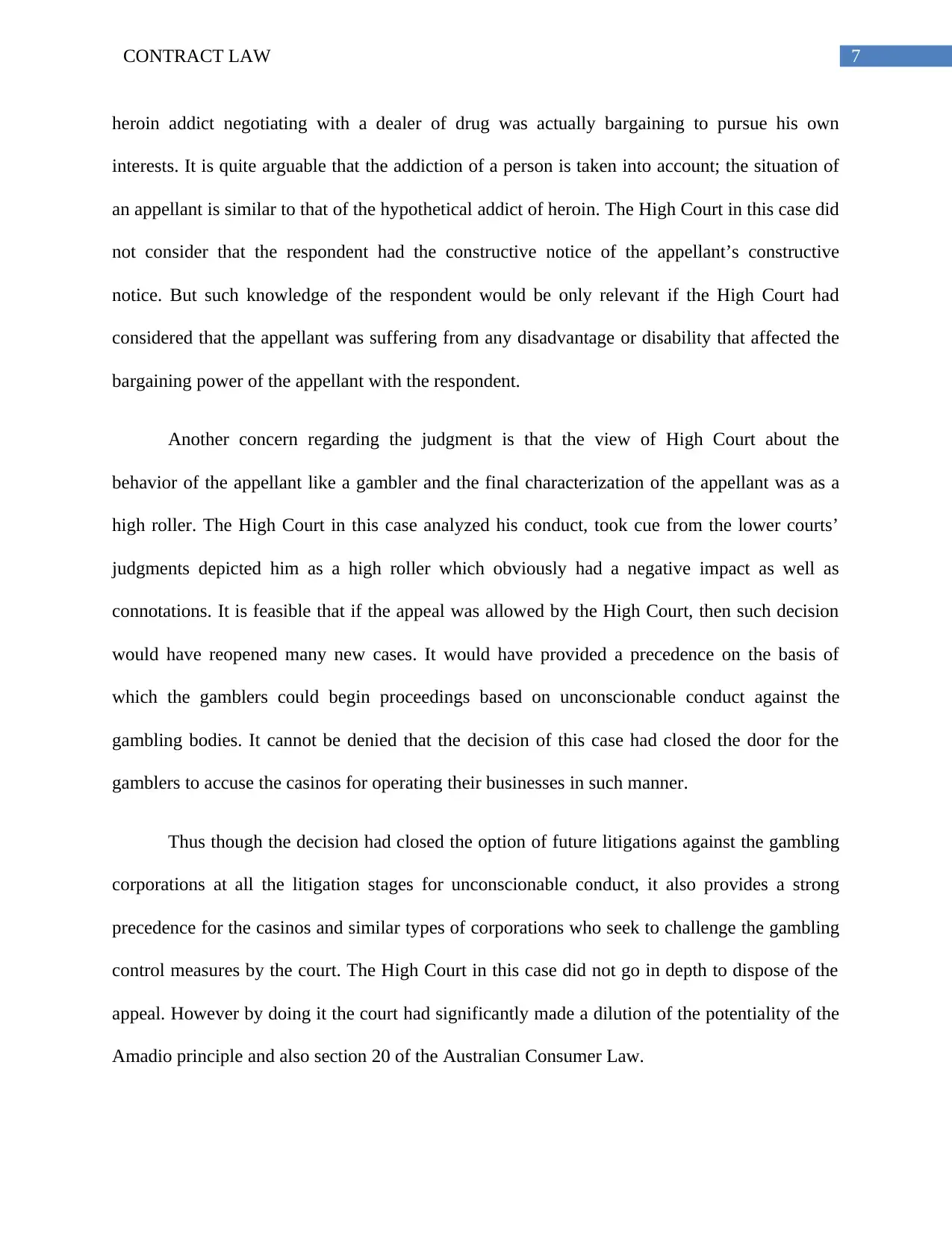
7CONTRACT LAW
heroin addict negotiating with a dealer of drug was actually bargaining to pursue his own
interests. It is quite arguable that the addiction of a person is taken into account; the situation of
an appellant is similar to that of the hypothetical addict of heroin. The High Court in this case did
not consider that the respondent had the constructive notice of the appellant’s constructive
notice. But such knowledge of the respondent would be only relevant if the High Court had
considered that the appellant was suffering from any disadvantage or disability that affected the
bargaining power of the appellant with the respondent.
Another concern regarding the judgment is that the view of High Court about the
behavior of the appellant like a gambler and the final characterization of the appellant was as a
high roller. The High Court in this case analyzed his conduct, took cue from the lower courts’
judgments depicted him as a high roller which obviously had a negative impact as well as
connotations. It is feasible that if the appeal was allowed by the High Court, then such decision
would have reopened many new cases. It would have provided a precedence on the basis of
which the gamblers could begin proceedings based on unconscionable conduct against the
gambling bodies. It cannot be denied that the decision of this case had closed the door for the
gamblers to accuse the casinos for operating their businesses in such manner.
Thus though the decision had closed the option of future litigations against the gambling
corporations at all the litigation stages for unconscionable conduct, it also provides a strong
precedence for the casinos and similar types of corporations who seek to challenge the gambling
control measures by the court. The High Court in this case did not go in depth to dispose of the
appeal. However by doing it the court had significantly made a dilution of the potentiality of the
Amadio principle and also section 20 of the Australian Consumer Law.
heroin addict negotiating with a dealer of drug was actually bargaining to pursue his own
interests. It is quite arguable that the addiction of a person is taken into account; the situation of
an appellant is similar to that of the hypothetical addict of heroin. The High Court in this case did
not consider that the respondent had the constructive notice of the appellant’s constructive
notice. But such knowledge of the respondent would be only relevant if the High Court had
considered that the appellant was suffering from any disadvantage or disability that affected the
bargaining power of the appellant with the respondent.
Another concern regarding the judgment is that the view of High Court about the
behavior of the appellant like a gambler and the final characterization of the appellant was as a
high roller. The High Court in this case analyzed his conduct, took cue from the lower courts’
judgments depicted him as a high roller which obviously had a negative impact as well as
connotations. It is feasible that if the appeal was allowed by the High Court, then such decision
would have reopened many new cases. It would have provided a precedence on the basis of
which the gamblers could begin proceedings based on unconscionable conduct against the
gambling bodies. It cannot be denied that the decision of this case had closed the door for the
gamblers to accuse the casinos for operating their businesses in such manner.
Thus though the decision had closed the option of future litigations against the gambling
corporations at all the litigation stages for unconscionable conduct, it also provides a strong
precedence for the casinos and similar types of corporations who seek to challenge the gambling
control measures by the court. The High Court in this case did not go in depth to dispose of the
appeal. However by doing it the court had significantly made a dilution of the potentiality of the
Amadio principle and also section 20 of the Australian Consumer Law.
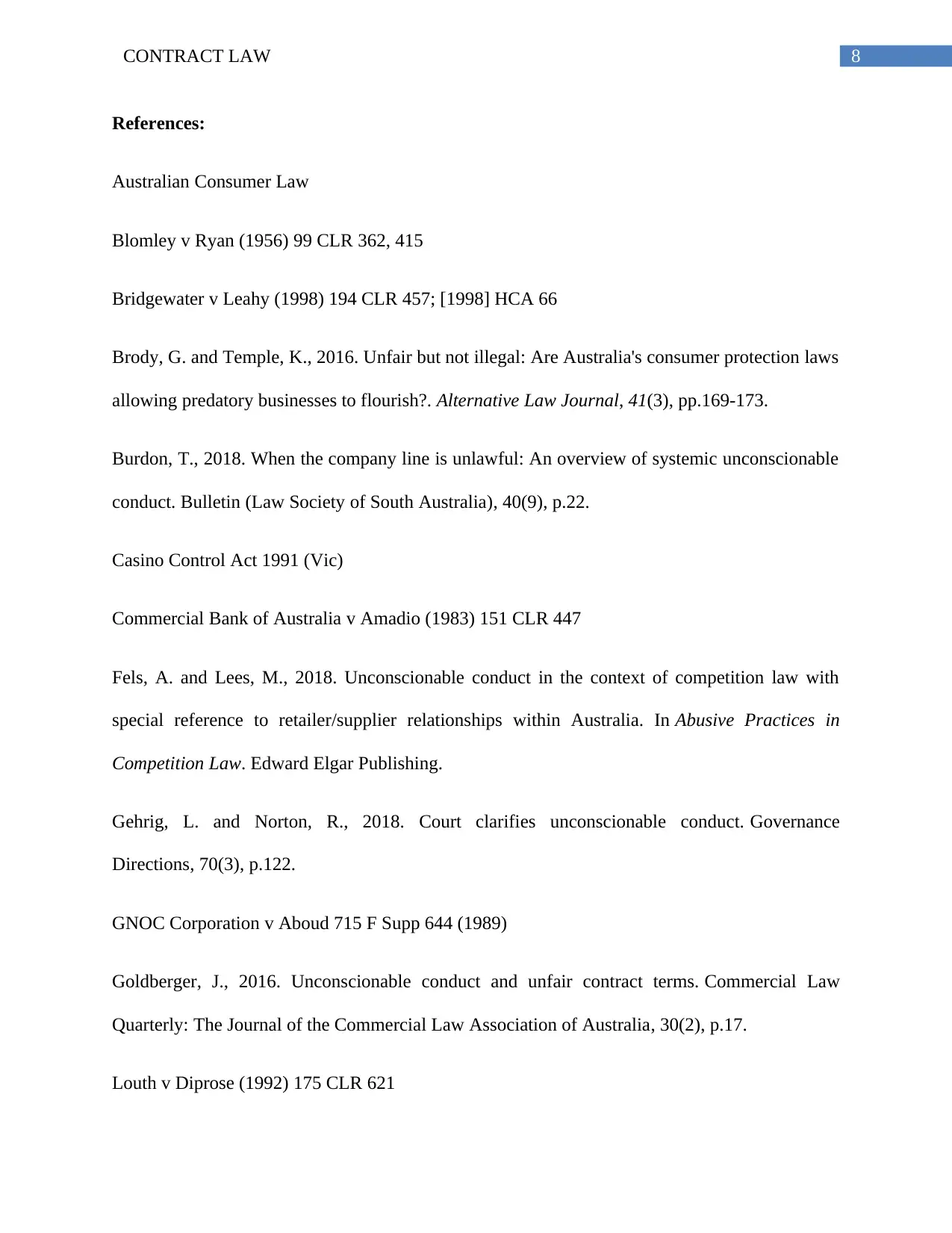
8CONTRACT LAW
References:
Australian Consumer Law
Blomley v Ryan (1956) 99 CLR 362, 415
Bridgewater v Leahy (1998) 194 CLR 457; [1998] HCA 66
Brody, G. and Temple, K., 2016. Unfair but not illegal: Are Australia's consumer protection laws
allowing predatory businesses to flourish?. Alternative Law Journal, 41(3), pp.169-173.
Burdon, T., 2018. When the company line is unlawful: An overview of systemic unconscionable
conduct. Bulletin (Law Society of South Australia), 40(9), p.22.
Casino Control Act 1991 (Vic)
Commercial Bank of Australia v Amadio (1983) 151 CLR 447
Fels, A. and Lees, M., 2018. Unconscionable conduct in the context of competition law with
special reference to retailer/supplier relationships within Australia. In Abusive Practices in
Competition Law. Edward Elgar Publishing.
Gehrig, L. and Norton, R., 2018. Court clarifies unconscionable conduct. Governance
Directions, 70(3), p.122.
GNOC Corporation v Aboud 715 F Supp 644 (1989)
Goldberger, J., 2016. Unconscionable conduct and unfair contract terms. Commercial Law
Quarterly: The Journal of the Commercial Law Association of Australia, 30(2), p.17.
Louth v Diprose (1992) 175 CLR 621
References:
Australian Consumer Law
Blomley v Ryan (1956) 99 CLR 362, 415
Bridgewater v Leahy (1998) 194 CLR 457; [1998] HCA 66
Brody, G. and Temple, K., 2016. Unfair but not illegal: Are Australia's consumer protection laws
allowing predatory businesses to flourish?. Alternative Law Journal, 41(3), pp.169-173.
Burdon, T., 2018. When the company line is unlawful: An overview of systemic unconscionable
conduct. Bulletin (Law Society of South Australia), 40(9), p.22.
Casino Control Act 1991 (Vic)
Commercial Bank of Australia v Amadio (1983) 151 CLR 447
Fels, A. and Lees, M., 2018. Unconscionable conduct in the context of competition law with
special reference to retailer/supplier relationships within Australia. In Abusive Practices in
Competition Law. Edward Elgar Publishing.
Gehrig, L. and Norton, R., 2018. Court clarifies unconscionable conduct. Governance
Directions, 70(3), p.122.
GNOC Corporation v Aboud 715 F Supp 644 (1989)
Goldberger, J., 2016. Unconscionable conduct and unfair contract terms. Commercial Law
Quarterly: The Journal of the Commercial Law Association of Australia, 30(2), p.17.
Louth v Diprose (1992) 175 CLR 621
⊘ This is a preview!⊘
Do you want full access?
Subscribe today to unlock all pages.

Trusted by 1+ million students worldwide
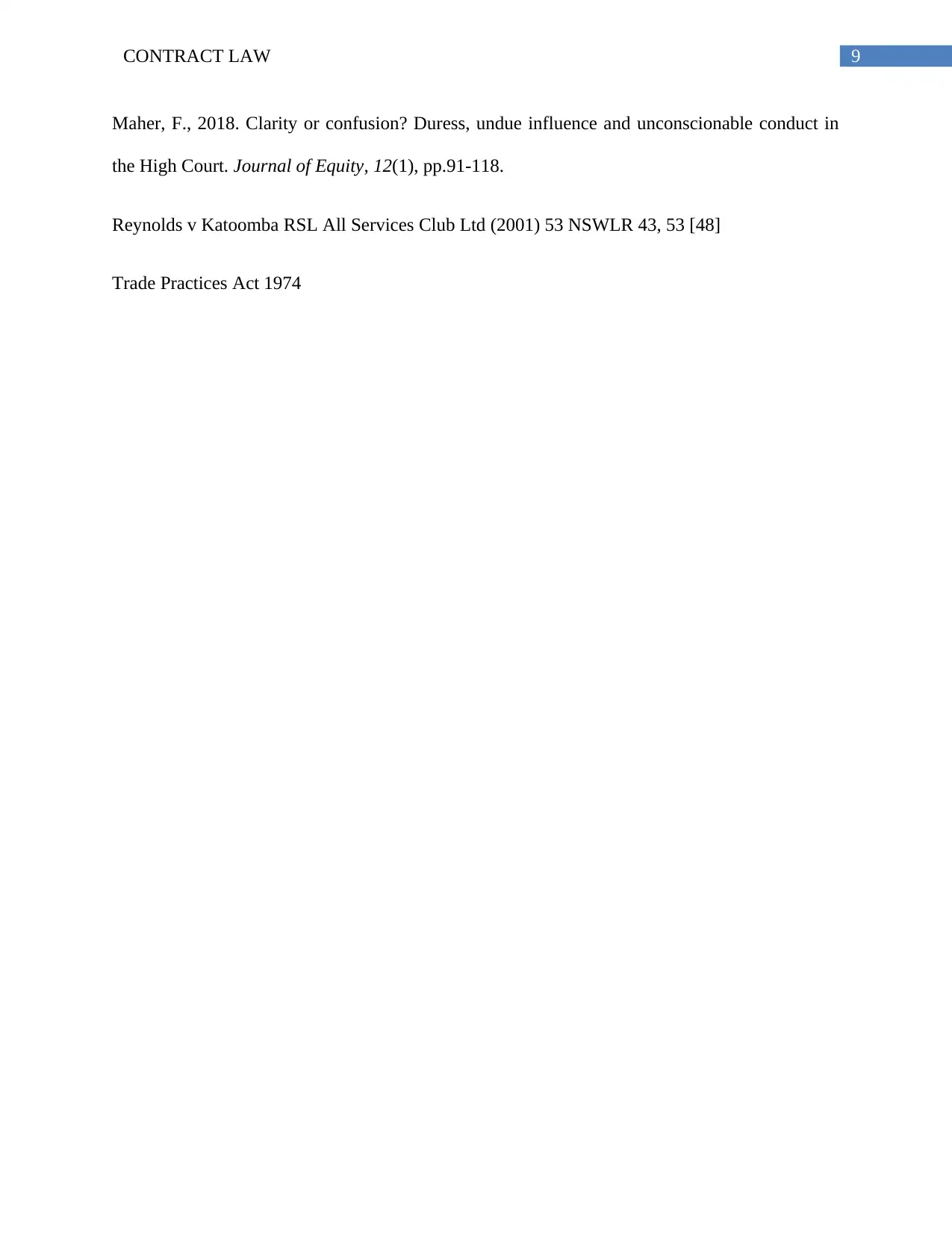
9CONTRACT LAW
Maher, F., 2018. Clarity or confusion? Duress, undue influence and unconscionable conduct in
the High Court. Journal of Equity, 12(1), pp.91-118.
Reynolds v Katoomba RSL All Services Club Ltd (2001) 53 NSWLR 43, 53 [48]
Trade Practices Act 1974
Maher, F., 2018. Clarity or confusion? Duress, undue influence and unconscionable conduct in
the High Court. Journal of Equity, 12(1), pp.91-118.
Reynolds v Katoomba RSL All Services Club Ltd (2001) 53 NSWLR 43, 53 [48]
Trade Practices Act 1974
1 out of 10
Related Documents
Your All-in-One AI-Powered Toolkit for Academic Success.
+13062052269
info@desklib.com
Available 24*7 on WhatsApp / Email
![[object Object]](/_next/static/media/star-bottom.7253800d.svg)
Unlock your academic potential
Copyright © 2020–2026 A2Z Services. All Rights Reserved. Developed and managed by ZUCOL.




